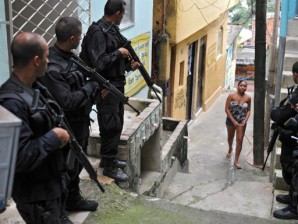
A resident walks past policemen of the Special Operations Battalion (BOPE) as they patrol a street at Ilha do Governador neighborhood in the favela do Dende shantytown in Rio de Janeiro, Brazil, on January 24, 2013. A rash of criminal attacks has been reported across the southern Brazilian state of Santa Catarina, and authorities blame them on a crackdown on drug trafficking and a prison-based gang. AFP PHOTO/VANDERLEI ALMEIDA
SAO PAULO—A rash of criminal attacks, including the torching of buses and firing on police, has been reported across the southern Brazilian state of Santa Catarina, and authorities blame them on a crackdown on drug trafficking and a prison-based gang.
In the latest incidents, a 22-year-old suspected criminal was killed in an overnight shootout with police in Joinville, in the north of the state, while shots were fired at police and three buses and two carts torched across the state, security officials said.
Around 20 people have been reported arrested since the night attacks on buses and police stations started Wednesday.
A statement from the Santa Catarina public security secretariat in Florianopolis linked the attacks to a stepped up crackdown by joint state and federal law-enforcement agencies on criminal gangs linked to drug trafficking.
State Public Security secretary Cesar Augusto Grubba was quoted as saying that “the new spate of attacks is the result of a strong and effective action against crime by security agencies.”
The statement also quoted another senior police official as saying the order for the attacks came from leaders of a prison-based criminal syndicate believed to have masterminded similar assaults last November.
Santa Catarina state officials announced a series of measures to contain the violence, including beefing up police with elite, quick-reaction units.
In Sao Paulo state, Brazil’s most populous with 42 million people, public security chiefs were replaced in November after a spike in criminal violence claimed more than 300 lives in and around the capital Sao Paulo from October.
The Sao Paulo violence, which petered out in December, was linked by local media at the time to a new flare-up in an undeclared war between the state military police and a prison-based gang known as the PCC, or First Commando of the Capital.